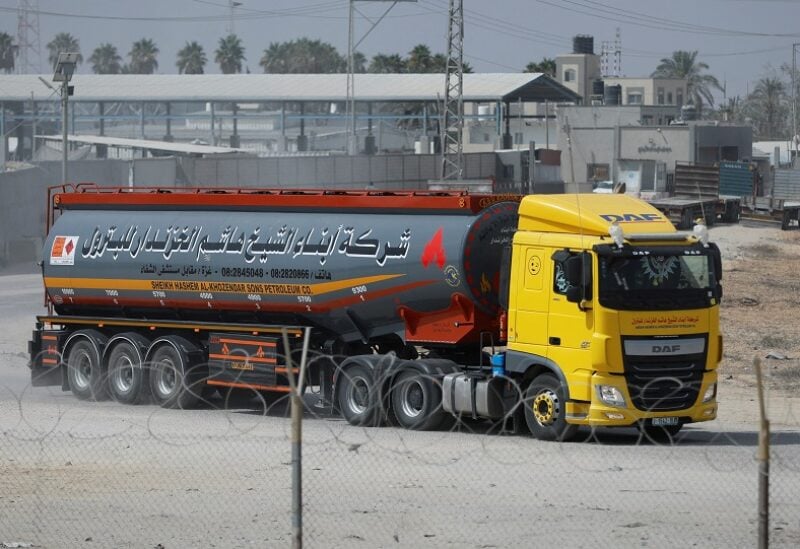
A truck carrying fuel imports for the lone power plant rolls into Gaza, after Israel eased up closures, as ceasefire holds in Rafah in the southern Gaza Strip, August 8, 2022. REUTERS/Ibraheem Abu Mustafa
With hopes that the intense conflict that left dozens of Palestinians dead has ended, fuel trucks entered Gaza as an Egypt-brokered truce between Israel and Islamic Jihad militants held Monday.
An AFP journalist at the goods crossing to southern Gaza saw trucks loaded with fuel enter the enclave, ending a severe shortage which had prompted the only power station there to shut down Saturday.
The arrival of vital supplies follows the start of a cease-fire at 11:30 p.m. (2030 GMT) Sunday to stem the worst fighting in Gaza since an 11-day war last year devastated the Palestinian coastal territory.
Gaza’s health ministry said 15 children were among 44 people killed in three days of intense fighting.
Despite a flurry of strikes and rocket attacks in the run-up to the truce, neither side had reported any major violations of the agreement overnight.
The Israeli military said roads would gradually reopen in the border area on Monday.
“It was decided to gradually lift the restrictions,” which have seen Israelis living near Gaza remain close to their bomb shelters, the army said.
US President Joe Biden welcomed the cease-fire and thanked Egyptian President Abdel Fattah El-Sisi for his country’s role in brokering it.
UN Middle East peace envoy Tor Wennesland said in a statement: “The situation is still very fragile, and I urge all parties to observe the cease-fire.”
Israeli Prime Minister Yair Lapid’s office late Sunday thanked “Egypt for its efforts” as it agreed to the truce, but said that “if the cease-fire is violated,” Israel “maintains the right to respond strongly.”
Islamic Jihad, an Iran-backed group designated as a terrorist organization by several Western nations, also accepted the truce but said it too “reserves the right to respond” to any aggression.
Starting on Friday, Israel had launched a heavy aerial and artillery bombardment of Islamic Jihad positions in Gaza, leading the militants to fire hundreds of rockets in retaliation.
In addition to those killed, Gazan health officials said 360 people had been wounded in the Palestinian enclave, which is run by the Islamist group Hamas.
A senior Israeli diplomatic official said Monday that “most of the civilians that were killed in Gaza were killed by Islamic Jihad rockets” that fell short or misfired.
Three people in Israel were wounded by shrapnel, while 31 others were lightly hurt while running for safety, emergency services said.
Islamic Jihad member Mohammad Al-Hindi said the cease-fire deal “contains Egypt’s commitment to work toward the release of two prisoners.”
They were named as Bassem Al-Saadi, a senior figure in the group’s political wing who was recently arrested in the occupied West Bank, and Khalil Awawdeh, a militant also in Israeli detention.
Gaza resident Nour Abu Sultan, 29, said the three days of conflict were “terrifying,” and that she had been unable to sleep during the “shelling and rockets, the sound of aircraft above us.”
Dalia Harel, a resident of the Israeli town of Sderot close to the Gaza border, said she was “disappointed” at news of a truce Sunday despite her five children being “traumatized.”
“We’re tired of having a military operation every year,” she said. “We need our military and political leaders to get it over with once and for all… we’re not for war, but we can’t go on like this.”
Islamic Jihad is aligned with Hamas but often acts independently. Hamas has fought four wars with Israel since seizing control of Gaza in 2007, including the conflict in May last year.
Israel has said it was necessary to launch a “pre-emptive” operation against Islamic Jihad, while the diplomatic official said the group had been planning an attack by sniper fire or with anti-tank missiles.
The army has killed senior leaders of Islamic Jihad in Gaza, including Taysir Al-Jabari and Khaled Mansour.
The senior Israeli diplomatic official said Islamic Jihad had been dealt “a very serious blow” which had “taken them back decades.”